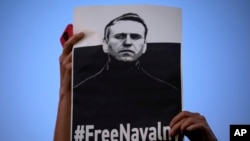It has been two years since officers of the Russian government attempted to assassinate democratic opposition leader Aleksey Navalny with a nerve agent called Novichok on Russian soil. When Mr. Navalny survived the brazen attack and bravely returned to Russia after recovering abroad, the Kremlin shamelessly imprisoned him on politically motivated charges.
State Department spokesperson Ned Price again “condemned Russia’s use of a chemical weapon to poison a political opponent, and call(ed) on the Kremlin to fully declare and dismantle its chemical weapons program.” The United States joins Navalny’s family, colleagues, and supporters around the world in calling for his immediate release.
Other Russian activists have suffered similar fates. In April, Russian authorities arrested Vladimir Kara-Murza, a democracy advocate and critic of Russian President Vladimir Putin, on the street near his apartment in Moscow. While he was in detention for a fabricated administrative violation, they charged him further with “spreading deliberately false information” about the armed forces of Russia. Kara-Murza is currently in pretrial detention and could face up to 15 years in prison if convicted.
This is not the first time the Kremlin has gone after Kara-Murza. He was poisoned twice, in 2015 and 2017, and left in a coma. These attempts on his life were widely viewed as the Russian government’s retribution for his work on the Magnitsky Act, which imposed targeted sanctions on Russian human rights violators.
Since launching its further invasion of Ukraine, the Kremlin has escalated its crackdown on dissent and independent media in Russia, including through broad censorship laws carrying harsh prison sentences. The Kremlin seeks to prevent the people of Russia from knowing about the atrocities its forces are inflicting on Ukrainian civilians, and also from learning about the high number of needless Russian military casualties in this unjust war.
Spokesperson Price reaffirmed the United States’ “solidarity with Aleksey Navalny, Vladimir Kara-Murza, and other political prisoners in Russia, as well as the thousands of other courageous Russian citizens who, despite personal risk, confront the Kremlin’s lies with the truth.”






